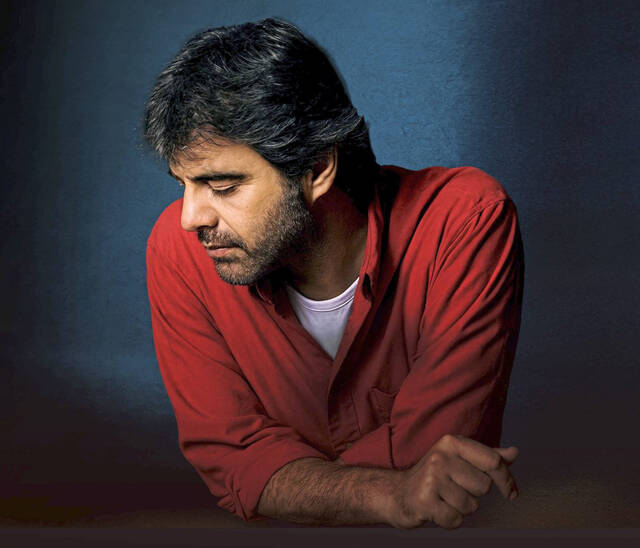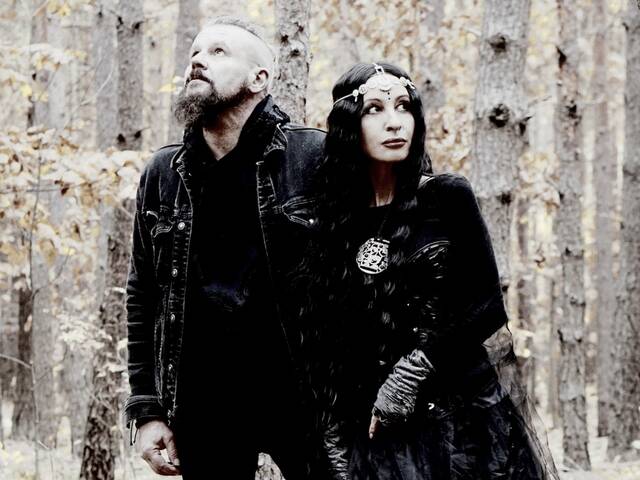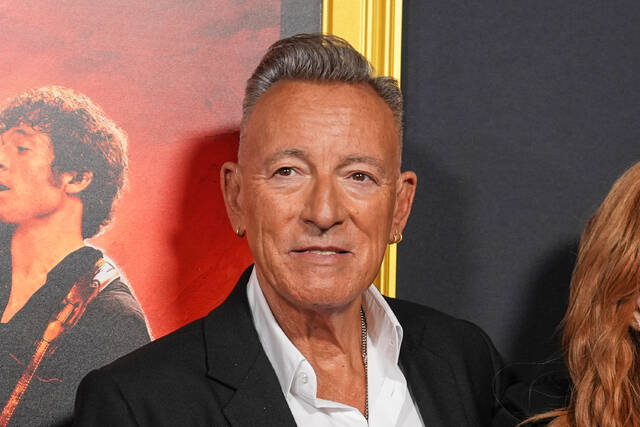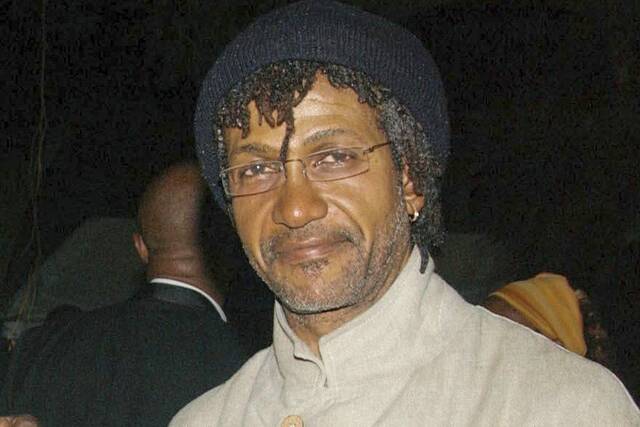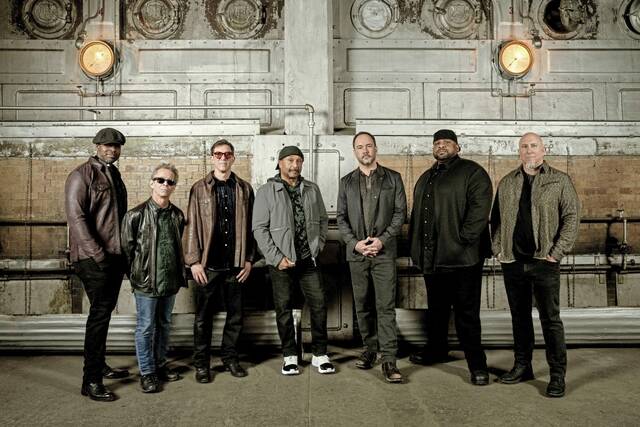It’s starting to feel like 2025 will be “the onslaught of Silverstein,” according to the band’s singer, Shane Told.
The Canadian post-hardcore band, which formed in 2000, will celebrate their 25th anniversary with their 25 Years of Noise tour in early January, including a Jan. 17 show at Stage AE in Pittsburgh. And they’ll be dropping a pair of albums this year — “Antibloom” on Feb. 21 and “Pink Moon,” which has yet to receive an official release date.
The original plan didn’t include two albums, but after recording in Joshua Tree, California, they wound up with a wealth of material.
“We had 25 songs, like done songs, not 25 half-baked ideas, 25 fleshed-out, produced, most-of-the-lyrics-written songs,” Told said. “So when we got together and we went over them, we had a lot of differing opinions about which ones were — we liked them all — but which ones were like the upper echelon, which ones are the track ones on the CD kind of thing.”
Cutting 25 songs down to 11 sounded “crazy” to Told, and holding on to some songs for an album down the road didn’t feel right. Told credited drummer/band manager Paul Koehler for coming up the idea for two albums.
“I was like, oh man, that’s a lot of time in the studio. That’s a lot of songs I have to sing — sing for real — but we thought about it and we kind of went, OK, well, we could do shorter records,” Told said. “So we’re going to do eight-song LPs instead of 10- or 11-song LPs. … So then it’s 16 songs and it’s like, OK, well paring it down from 25 to 16, maybe we can stomach that, but there’s still songs we cut that I love still.
“So that I think speaks to the strength of these records, the fact that there’s still stuff leaving off that I think is some of our best material. So it is a really exciting time. And I just can’t wait for people to hear it.”
When it came down to actually choosing what made the cut, there were a few obvious choices. To narrow it down, they came up with a ballot where they ranked the songs, but that still led to some consternation.
“Then it was like, but that song is good. Why is it down on the list? It’s like, well, the voting is flawed. That could be an analogy for a lot of things. And it’s funny just how it ends up shaking out and how it’s never really a true democracy in any band,” Told said with a laugh, “but we tried.”
While Antibloom will be released in February — with two singles, “Skin & Bones” and “Confession,” already out — “Pink Moon” is already wrapped up, too.
“It’s funny, we just got done mastering ‘Pink Moon.’ It’s in the can and everything. So I went back and listened to that again, hadn’t listened to it really in a few months. And, oh man, I think it’s better than the other album,” Told said with a laugh. “I think it’s better. And we didn’t try to make, ‘Oh, but we got to put the better songs on the first record.’ We didn’t really think of it like that. This was actually exciting because we got to have two album closers (and) two album openers …. So that was really fun to put together.”
In a December call from Las Vegas, Told also discussed the band’s diverse sound, the inspiration for “Skin & Bones,” his podcast and more:
Do you think these albums showcase the band’s growth over all these years?
Oh, a hundred percent it does. I mean, we’ve always been a band that’s had a lot of diversity in our music. We do everything from pretty mellow stuff like acoustic guitar and strings, very quiet singing, to like full-on, as heavy as it gets. And we put those all on the same albums, and we have some pop punk stuff in there, and we have some pretty rock stuff. So we really do sound like a lot of things and a lot of times in the same record and a lot of times in the same song.
So I think that these two records really showcase the 25 years of the band and the peaks and valleys that we’ve had musically. But I think the quality of the compositions, of the lyrics and just trying to capture great musical moments, I think it’s such an underrated thing. Every music fan, there are songs, bands, you just love this (expletive) part. I just love that part. You need to capture that when you’re writing a song. It’s not enough to just be like, yeah, it’s a great chorus. It’s really catchy. It’s like, what is that though? What is that thing where it takes the listener and it grabs them and it won’t let them go for their whole life? There are songs I heard 30 years ago that I still hear them today, and I feel what I felt that first time. How can you do that? How can you find that moment? And I think these records are full of those moments.
From what I understand, “Skin & Bones” is a pretty personal song for you. Are you able to elaborate a little bit on the story behind that one?
Earlier this year, my ex-girlfriend was murdered. It’s very horrible. And really, when I say it out loud, it still doesn’t feel real. This is a person that I spent seven years in a relationship from when I was 18 till I was 25. So these are some real formative years, before the band even started, until the band was successful and grew up a lot and learned a lot and we’d stayed in touch over the years. And quite recently, actually, we’d hung out again and went over to her house where she was murdered and she made me lunch and, we just had a lot of really important times in our lives. And for her to be gone, and in such a horrific way, I think kind of shaped me in a way I hadn’t really been shaped before emotionally. And I wasn’t ready to write about that for a while.
And this happened and we were in the middle of writing a record, it was really tough, man, to have this happen and then have to focus on an album. But in a way, I think, I’m not a religious guy at all. And I’m not, I don’t know what happens when you die, but I did feel like something carried me through that. And I think that, I don’t know, I don’t think we know everything. So maybe it was just my own internalizing, but regardless of what it was, to get through that, I think something guided me through. And that song, it’s full of inside jokes and conversations that we had. And I don’t expect everyone to understand all of the words, but it’s not really for anyone except for me and for her. So, that being said, I have heard people thank me for writing something so relatable for them. And also, for anyone that’s dealt with a sudden death, especially a death like this, I know what you’re going through. So I think that’s important too, to just try to express that the best I can.
Do you think it helped to help process your emotions by writing that song?
I think so, yeah. It’s still a process, man. There are days when I’m fine and I barely think about it, or I think about it and I can kind of like smile about the good moments or whatever. And then there’s other days when it’s really hard and it really hurts. And I understand that that’s just part of what happens when you go through this. But I think I am happy that I wrote the song and that it’s something that’s resonating with people, even if I didn’t try that hard to, because I really just wrote it for myself.
Ultimately one of the goals of musicians is to be able to reach out to the audience and have something relatable, and even though it’s not their story, you touch them.
Yeah, and you know what I’ve found over years about writing, something I learned pretty early in my career is the more real you are with yourself and your emotions, the more that relates to other people, because we’re all the same. We all go through the same things, and that is what makes music timeless. And that is why the music that we’ve made has survived the test of time, because things that kids are going through today, the emotions and the relationships and their ongoing problems, timeless problems forever.
And that’s why our genre, whatever you want to call it, is still around and is still thriving. Whereas, hair metal, talking about chicks in fast cars, that stuff didn’t really last because there’s no emotion to it. There’s no real feeling. It was a fashion. And I think, of course, we had a fashion within our music, some of which wasn’t great; however, at its core, the music and the lyrics really did and do mean something.
Related
• Silverstein, Drive-By Truckers highlight top January concerts in Pittsburgh• Top 25 concerts coming to Pittsburgh in 2025 (so far)
• 2025 Pittsburgh area concert calendar
What kind of lessons have you learned in talking to all these musicians (with your Lead Singer Syndrome podcast)? Are there any questions that you’ve learned to hate by doing this for so long?
I don’t hate any questions. I think the only question that I think kind of annoys me is just, where did you get your band name? ‘Cause I answered that 25 years ago, and it seems like you can probably figure that one out pretty quickly without me having to go through it again, even though it’s not a bad story at least. It’s not like, well, we just thought of it, thought it sounded cool. That would be a bad one. But yes, if you want to know that, you can Google it.
I think through the podcast, the biggest thing I’ve learned is that every lead singer didn’t want to be a lead singer. They were a drummer or a guitar player, and they wanted to do that. And then they were the only person in the room that could marginally carry a tune. So they got stuck singing and then they got better and better and better at it. And now, no matter how many millions of albums they’ve sold or how iconic they are as a singer or have incredible voices, they still say, well, I’m a drummer. It’s like, yeah, you’re not a drummer, you’re not a drummer. But that is the thing that I think, I would say it’s 85% of my guests, but it might even be higher. Nobody is just a singer. So if you want to be successful as a singer, play some drums, I guess, that’s my advice.
Do you still consider yourself a bass player?
I’m a guitar player. Yeah, I’m a guitar player. Yeah, a hundred percent, I’m a guitar player. And I was the only guy in the room that could carry a tune. It’s my story, too.



